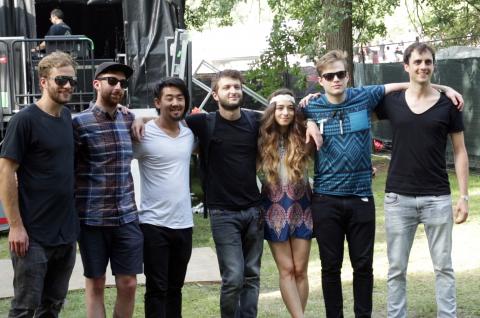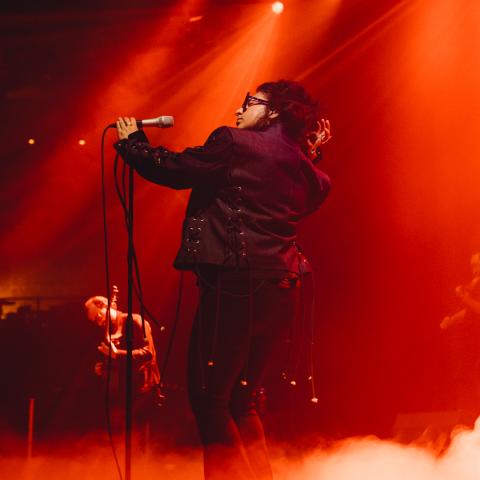A Shot on the Big Stage
By Mike Magee and Bryan Parys
It’s 10:00ish on a late July morning and it’s already hot when professor Jeff Dorenfeld of Berklee’s Music Business/Management Department picks me up. We’re headed to Chicago, to Lollapalooza. It will get hotter. By the end of Friday, the first day of the massive three-day music festival held in Chicago’s Grant Park, I will have walked 22 miles in my new Vans. That I did not expect. Waiting for us at the airport are Kyle Thornton & The Company, a standout Berklee band from the most recent Heavy Rotation Records (HHR) release, Dorm Sessions X. Their song “Lemonade” is the perfect infectious summer tune blending great songwriting and musicianship from the group’s eight members.

Kyle Thornton (left) and Henry Young of Kyle Thornton & The Company onstage at Lollapalooza
Audrey Harrer
Dorenfeld, and I talk about how Lollapalooza has grown so significantly while label signing bonuses, record deals, and corresponding sales have moved in the opposite direction leaving emerging and established artists alike searching for a new monetization model. This is something that Dorenfeld and his Berklee cohort have been thinking about a lot lately. With the support of some very generous donors, the college has established the Berklee Popular Music Institute (BPMi). Founded and led by Dorenfeld, the institute uses real-world experiential learning to prepare students for this evolving landscape. BPMi is essentially built around an annual cycle that begins by putting artists together with music business students and booking holds on performance slots at major festivals. Between the pairings and the festival dates the following summer, each student puts into practice what they’ve been learning in class, from contracts and the craft of performance to website/digital presence and recording.
We arrive at the airport and are greeted by Berklee student Meagan Fair. As she hands me my boarding pass, it’s apparent that she has it under control. She’s calm, composed, and professional. Fellow students Grayson Kirtland and Simone Torres join us as Dorenfeld covers some details with Fair. I’ve come to expect a lot from Berklee students and Kirtland and Torres are great examples of why the proverbial bar is set so high. Torres, a dual major (Music Production and Engineering and Music Business/Management) brought a soldering iron. I’m impressed. The band is already at the gate. Seatbacks and tray tables in upright position…
My experience with these types of gigs is that something always goes wrong. What matters is how you react to the inevitable. Fair, Kirtland, Torres, and I head to the Kidzapalooza stage the night before to set up a “silent concert” for the festival’s youngest music fans. The idea of a silent concert is that all of the instruments laid out for the kids are fed into several headphone amplifiers. Parents can don headphones to listen, but the performance is otherwise silent. At the moment, though, the entire thing is silent: no bass, no drums, no clear solution in sight. We take a collective deep breath and Torres methodically evaluates the formidable assortment of cables and electronics. She’s undaunted and confident. She tested everything twice before she left Boston and soon has the issue managed—no need for the soldering iron. I admit, part of me was hoping we’d need it.
Show Orientation
Friday arrives and it’s clear that it’s going to be very hot. I’ve seen countless Berklee bands in my 11 years at the college. Most often these performances take place on short, dark stages. Lolla—no surprise—is different. The festival has artist catering, no-nonsense security, multiple levels of access, and very high and specific expectations. Arriving late is not an option, nor is going over your time allotment.
Of equal if not greater importance are the performance and stage presence differences. What works in a small nightclub setting does not on a huge outdoor stage under the blazing midday sun. It’s this that I’m most interested in seeing and what Dorenfeld has been teaching about in his classes. How do bands manage this transition from a neighborhood haunt to a festival stage? How does a band excel at playing to the last row of fans when they can’t even see them?
The band takes the stage as one cohesive unit. Their look is matching but not overdone. It becomes clear that they’re not here to procrastinate. There’s no tuning, discussion or delay. The music begins immediately and the band breaks into a well-placed and unexpected Led Zeppelin tease. The entire band hits their stride right out of the gate and a bolt of energy shoots through the crowd. Wow. This is going to be good.
Both Kyle Thornton and Zak Lewis, the band’s trombonist, take turns in the spotlight and both excel. The entire band is locked in with the audience happily in tow. “We put in a lot of hard work,” trumpeter Noah Conrad says. “To play the show and see that it pays off just makes us want to work harder. It’s a very inspiring weekend.” Bassist Henry Young observes, “At Berklee we’re used to playing for musicians and our peers, Lollapalooza is a different kind of show and we’re going to come back to Berklee with a completely different mindset about performance.” “Playing on a stage as big as the one we played on really puts things into perspective,” adds Conrad. “You realize that being on one of the bigger stages isn’t such a far away thing.” Thornton agrees. “It was exhilarating. It was nothing I’ve ever experienced before. It was an experience I’ll never forget. Ever.”
Far Outside the Classroom
These are the experiences at the core of BPMi. As things ramp up Dorenfeld’s future plans include having several acts touring simultaneously in a small fleet of buses. They’ll work their way towards a festival like Lollapalooza while playing gigs and volunteering at City Music network sites. Along the way they’ll pick up the kind of experience that is so hard to replicate in a classroom setting.
As we make our way back to Boston it’s clear that I’m talking to a different group than the one that I met three days ago. They’re more confident, and for good reason. They far exceeded all of our lofty expectations and had a fantastic performance on a really big stage. Beyond the confidence, though is a renewed sense of vigor. Despite three very long days in the heat, there’s surprisingly no talk of rest. Instead they’re focused on what lies ahead, on how to get that next taste of a big stage, of a big audience. For Kyle Thornton & The Company, it seems there will be many of both in their future.
Pondering their experience at Lollapalooza, Thornton sums it up as we depart. “It’s nothing but encouraging for us. This is just the start. We’re so excited to go back to Boston and amp things up.”
—Mike Magee
Meanwhile in Canada...
That same weekend as Jeff Dorenfeld and Kyle Thornton & The Company traveled to Lollapalooza, Jeff Apruzzese ‘08—formerly the bassist for Passion Pit, and now media and operations manager for BPMi—was in a van with another group of Berklee students and alumni. Apruzzese and Cordelia and the Buffalo headed to Canada’s Osheaga Festival. Parc Jean Drapeau, a small island with vistas of the skyline where Montreal meets the St. Lawrence River, has been home to this three-day music and art festival that boasts close to 60,000 concertgoers each day for the past decade.

Cordelia & The Buffalo at the Osheaga Festival. From the left: Dag Hanken ’15, Jeff Apruzzese (Berklee staff), Yusuke Sato ’15, Diego Diaz ’15, Cordelia Vizcaino ’16, Rodrigo Gramitto ’17, and Dan McCallum ’15.
Jeannie Greely
The band is the brainchild of singer Cordelia Vizcaino Leal ’16 and its anthemic sound brings together the worlds of indie rock with a distinct international flair (of the band’s five members, the countries represented include Japan, Mexico, America, Venezuela, and Norway). Leal has a deep connection to her Mexican heritage, particularly native cultures. She shares that Aztec and Mayan tribes used music to “portray their spirit and their life.” She seeks a similar symbiotic relationship in her own music, as is evident in the band’s song “Free,” which combines rock instrumentation with traditional Olmec and Aztec instruments such as the ayoyotl (a percussion instrument made from seed pods) and huehuetl (a type of drum).
The prospect of sharing the bill with some of their favorite, established bands—Weezer, Kendrick Lamar, and the Black Keys—has the band more than excited, but surprisingly calm when asked about the upcoming performance. “We’ve been preparing for this for months now,” Leal says. “It’s like that feeling of being fully and completely prepared for a test. At that moment, you can turn it on and relax and enjoy the moment.” For bassist Dan McCallum ’15, who majored in performance, it’s about reaching that “perfect harmony between having a total blast and also being extremely serious about really giving this 100 percent. But you can’t have one without the other.”
Experiential Transformation
The road to Osheaga was much longer than the 300 miles between Boston and Montreal. In fact, it began almost a year ago when Dorenfeld chose Leal’s band to be featured alongside Kyle Thornton & The Company and others on Dorm Sessions X. As in years past, Dorenfeld chose standout acts from HRR releases, paired them with music business students, and sent them to major concert festivals. BPMi seeks to formalize and maximize this type of immersive experience by sending pairings to six major festivals each summer.
Dorenfeld is well aware that his young charges tend to feel daunted by the prospect of going out onto the festival stage, but every band has become better from the experience. “They step off the stage with more confidence, better playing, and the realization that this is something they can pursue,” Dorenfeld says.
Certainly this was the case with Cordelia and the Buffalo. Their performance drew hundreds of festivalgoers, some of whom the band had already met in their short time at Osheaga, and many other intrigued passersby who were drawn in for their set. After hours in a van with Apruzzese driving and sharing bits of wisdom he’d gleaned from years of touring with Passion Pit and logging its biggest show to date, you could sense that Cordelia and the Buffalo had already reached a deeper understanding of what it meant to be a band at a major festival. And while a typical fan might see a festival band and think that this is the culmination of a childhood dream, the players themselves have a longer vision. “[Since] I was a teenager, all the things I thought would be involved in being a professional musician have already happened [for me],” says guitarist Rodrigo Gramitto ‘17. “I’m so grateful that they have, because now I have much bigger goals—far greater than I ever thought I would pursue.”
—Bryan Parys
Mike Magee is the senior director for institutional advancement, and Bryan Parys is an editor/writer for digital strategy/communications.




